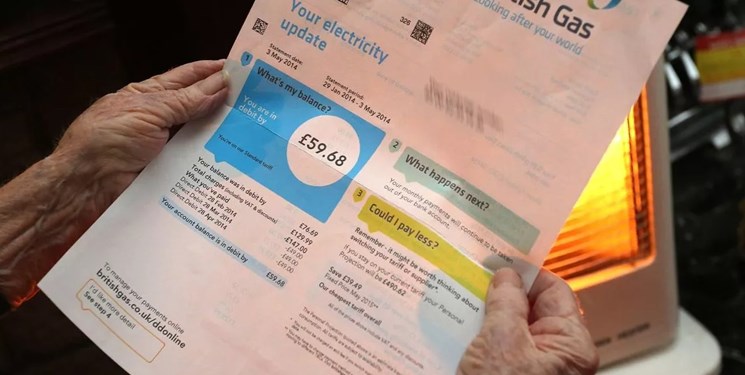TEHRAN (FNA)- Energy bills in Great
Britain are expected to rise by 5% from January after analysts
predicted that the government’s price cap could increase to about £1,930
a year for a typical gas and electricity bill.
Households can expect a “tough winter ahead” after a jump in gas market prices that is likely to raise the cap on what suppliers can charge for energy by an average of £100 a year, according to Martin Young, an analyst at the investment firm Investec, The Guardian reported.
Young said
his final estimate for the energy price cap that would be used to
determine most household energy bills between January and March would
climb to an average of £1,928, up from £1,834 now.
Cornwall Insight, a leading energy consultancy, has estimated that the price cap for the first quarter of next year could rise slightly higher to an average of £1,931 for the typical household.
The forecasts are based on the wholesale market prices for gas and electricity, which have climbed in recent weeks after the start of the Israel-Hamas war last month.
Craig Lowrey, a principal consultant at Cornwall Insight, said, “An unstable wholesale energy market, coupled with the UK’s reliance on energy imports, makes it inevitable that energy bills will rise from current levels. This leaves households facing yet another winter with bills hundreds of pounds higher than pre-pandemic levels, and affordable fixed deals few and far between.”
The concern over rising energy costs has been compounded by the increase in standing charges, which suppliers add to bills as a flat daily fee, often likened to line rental for a phone, to cover the cost of connecting households to their energy supplier.
On Thursday the energy regulator Ofgem opened a review of standing charges, which for some households have doubled over the past two years. From October 1 the amount these charges add to a typical dual fuel bill will rise to above £300 a year – a figure that some argue unfairly penalises low-income households.
Tim Jarvis, the director for markets at Ofgem, said, “We know that standing charges have provoked a huge amount of debate in recent months, and, with wider cost of living pressures meaning customers will continue to struggle with bills, now is the right time to look at this again."
“The standing charge is covered by the price cap, which puts a ceiling on what suppliers can set it. Suppliers are also under no obligation to have a standing charge and can charge less than what is set out in the price cap," he said.
“However, it’s a complex issue and while an upfront set fee to cover a suppliers fixed costs works for some, it doesn’t work for others. Equally, spreading the costs differently might help some but our previous analysis has found it can also penalise some really vulnerable households,” he added.
This article was published in Fars News Agency and is re published here under a creative commons licence.

Comments
Post a Comment